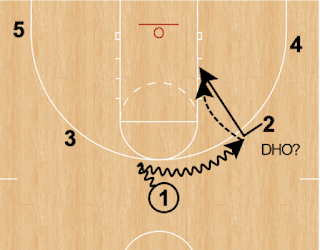"Technique beats tactics." - Greg Popovich
With skilled players, tactics enhance performance. With unskilled players, devoting precious practice time to more tactics has a low return on investment.
Players who can execute spread offense offer more options while emphasizing spacing.
Team sports create "packages" of offense or defense:
- Baseball - first and third "steal" situations include myriad choices - throwing through, shortstop cut off, pitcher cut off, fake and throw to third, etc.
- Football - bunch formations or five wide formations
- Basketball - spread, horns, 1-4 high or low, etc.
Tailor your choices to personnel, experience, and your coaching style. Here are a few.
1 player - Isolation/drive
Cutter clears to open gap and x4 is pressured to help or stay home ("20-80"). You can also down screen both wings and isolate from there.
2 players - back cut, give and go, pick-and-roll (and variations)
3 players - Flexish (Bucks variation), pass and screen away, 3 or layup
Spread Spain PnR (back screen the roller)
Emphasize skill development so players can create and finish. If not, "we can't run what we can't run."
Lagniappe (something extra). Breakdown drill for the top of spread.
Lagniappe 2. I encourage readers to read Coach Meurs's commentary, "Do we move the ball in order to run the play? Or do we run the ball in order to move the ball?"
Another reason for plays is the lack of 'schoolyard play' as parents prioritized young people's safety and parental oversight and involvement grew.
What prompted parents to become so invested in their children's success? Julie Lythcott-Haims explains the transformation, migrating from safety concerns (Adam Walsh), to parent-supervised scheduled play, culture shifts emphasizing self-esteem, and parents taking direct anteambulo functions on college campuses. "In 1990, child development researchers Foster Cline and Jim Fay coined the term "helicopter parent" to refer to a parent who hovers over a child in a way that runs counter to the parent's responsibility to raise a child to independence."
Societal shifts promoting child safety, oversight, and success amidst tough competition changed norms (going to the park) to continuous supervision. It wasn't the kids' fault or truly the parents' either. Circumstances created a New Normal...more parental oversight and intervention.
Societal shifts promoting child safety, oversight, and success amidst tough competition changed norms (going to the park) to continuous supervision. It wasn't the kids' fault or truly the parents' either. Circumstances created a New Normal...more parental oversight and intervention.






